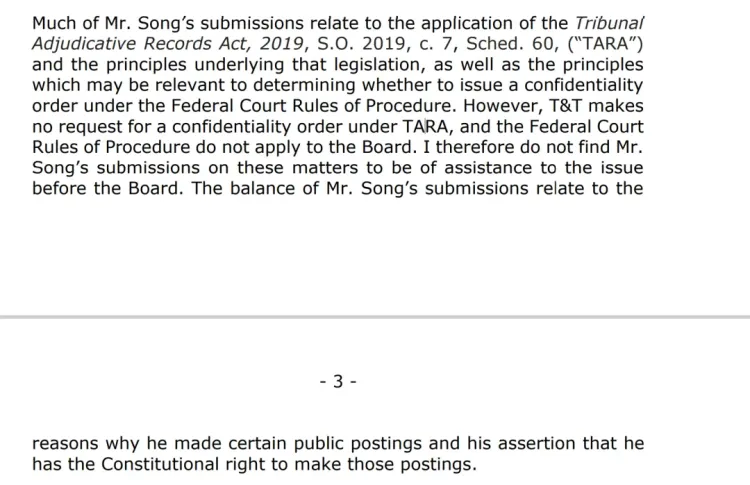送菜哥按:这一次大统华申请confidentiality order的动议,法官已经下达order。其间,送菜哥学习到了如何评价一个正在进行中的案子。关于这个问题,目前看来,加拿大的成文法、判例法都已经非常成熟。但是,对于中国来说,基本还是空白。因此,送菜哥,准备分几期,来讨论这个问题。这是第二篇,谈公开审判原则,其不公开审判需要满足的条件。
1.Open court principle,维基百科是这样解释的:
公开法庭原则要求法庭诉讼程序应当公开,并向公众和媒体开放。
相比之下,不公开审理指的是公众和媒体不允许观察法庭审理程序或过程。
加拿大最高法院在A.G. Nova Scotia v. MacIntyre中讨论了开放的美德,并引用了十八世纪哲学家杰里米·边沁的话:
在秘密的黑暗中,各种形式的邪恶和险恶都肆意横行。只有公开审判才能制止司法不公正。没有公开审判就没有正义。公开审判是正义的灵魂。它是激励人们努力的最大动力,也是防止不公正的最可靠手段。它保护法官在审判期间不受伤害。
根据加拿大最高法院在Vancouver Sun (Re)一案中的说法,公开法庭原则增强了公众对司法系统的信心:
公众可以进入法庭,这可以证明“司法公正是依法、非任意实施的”,从而保证司法程序的公正性。公开性对于维护法院的独立性和公正性必不可少。它对于公众对司法系统的信心和公众对司法管理的理解至关重要。此外,公开性是司法程序合法性的主要组成部分,也是当事人和广大公众遵守法院裁决的原因。
2.前面提到,在接到OLRB5月27日的Order,要求我对大统华申请confidentiality order的申请提出意见的时候,我搞不清楚需要对未经质证的证据予以保密的implyed undertaking rule(默示保密原则)与 adjudicative records (司法档案)以公开为原则之间的区别,实际上根据司法档案应予公开的成文法、判例法向OLRB提出意见。
3.针对我的答辩,大统华在6月3日提出,他们不是依据Tribunal Adjudicative Records Act, 2019(TARA)提出申请,因此,我的答辩是不相关的。OLRB在6月4日的Order中也指出,大统华并没有依据TARA申请confidentiality order,因此,我根据TARA及联邦诉讼程序规则提出的在本案中没有适用的余地。

4.法官的order点中要害,非常有道理。同时,法官也依据这一点,驳回大统华要求我删除大统华承认:跟踪我的是杂货部主管这个帖子申请。大统华的理由是,我在里面粘贴了一段大统华答辩状中的表述(杂货部主管注意到我在过去几周有早上小休的习惯)。但是,法官说,大统华没有依据TARA提出申请,而删除这个帖子,需要符合TARA的要求。


5.在本篇中,就来讨论,要求送菜哥删除含有答辩状内容的帖子,以及进一步而言,如果要求不得披露所有的司法档案,或者用一句我们中国的话而言,不公开审理,需要满足什么样的条件。
6.联邦法院程序规则(Federal Court Rules, 1998, SOR/98-106)及相关的判例法
6.1联邦法院程序规则的规定
Motion for order of confidentiality
151 (1) On motion, the Court may order that material to be filed shall be treated as confidential.
Marginal note:Demonstrated need for confidentiality
(2) Before making an order under subsection (1), the Court must be satisfied that the material should be treated as confidential, notwithstanding the public interest in open and accessible court proceedings.
大概意思就是说,如果向法院申请对向法院提交的各种司法档案保密,需要让法官确信,保密的必要性超过诉讼程序公开的必要性。
6.2判例法
我在5月30日向OLRB提交的答辩里面引用了Sierra Club of Canada v. Canada (Minister of Finance), [2002] 2 S.C.R. 522, 2002 SCC 41at para3 53-54
A confidentiality order under Rule 151 [of the Federal Court Rules of Procedure] should only be granted when:
(a) such an order is necessary in order to prevent a serious risk to an important interest, including a commercial interest, in the context of litigation because reasonably alternative measures will not prevent the risk; and
(b) the salutary effects of the confidentiality order, including the effects on the right of civil litigants to a fair trial, outweigh its deleterious effects, including the effects on the right to free expression, which in this context includes the public interest in open and accessible court proceedings.
As in Mentuck, I would add that three important elements are subsumed under the first branch of this test. First the risk in question must be real and substantial, in that the risk is well grounded in the evidence, and poses a serious threat to the commercial interest in question.
In addition, the phrase “important commercial interest” is in need of some clarification. In order to qualify as an “important commercial interest”, the interest in question cannot merely be specific to the party requesting the order; the interest must be one which can be expressed in terms of a public interest in confidentiality. For example, a private company could not argue simply that the existence of a particular contract should not be made public because to do so would cause the company to lose business, thus harming its commercial interests. However, if, as in this case, exposure of information would cause a breach of a confidentiality agreement, then the commercial interest affected can be characterized more broadly as the general commercial interest of preserving confidential information. Simply put, if there is no general principle at stake, there can be no “important commercial interest” for the purposes of this test. Or, in the words of Binnie J. in F.N. (Re), [2000] 1 S.C.R. 880, 2000 SCC 35 at para. 10, the open court rule only yields “where the public interest in confidentiality outweighs the public interest in openness” (emphasis added in Sierra Club).
意思就是说,申请保密令,需要满足如下三个条件:
1.保密令对于维护包括商业利益在内的重要利益的保护是必不可少的,而且找不到其他替代方法来保护这一重要利益。
2.保密令所保护的重要价值,超过保密令对于言论自由以及公众参与、接触诉讼程序带来的不利影响。用Binnie J.在F.N.(Re),[2000] 1 S.C.R. 880, 2000 SCC 35第10段中的话来说,公开法庭规则只有在“保密性的公共利益超过公开性的公共利益”时才会让步。
3.“重要商业利益”这一短语需要一些澄清。为了被认定为“重要商业利益”,相关利益不能仅仅是请求保密令的当事方特有的利益;该利益必须是可以用公共利益中的保密性来表达的。例如,一家公司不能仅仅因为某合同的存在被公开会导致其失去业务,从而损害其商业利益,而要求保密令。然而,如果像在本案中那样,信息曝光会导致以防违反与其他方所签署的保密协议,那么受影响的商业利益可以更广泛地表述为保护机密信息的一般商业利益。简而言之,如果没有一般原则作为基础,就不可能在本测试中存在“重要商业利益”。
7.我在5月30日答辩中提出的TARA及相关判例
7.1关于司法档案的范围,前面的文章已经提到过,本篇不再赘述。
7.2对于司法档案颁发保密令需要满足的条件,TARA这样的规定的
Confidentiality orders
2(2) A tribunal may, of its own motion or on the application of a person referred to in subsection (3), order that an adjudicative record or portion of an adjudicative record be treated as confidential and that it not be disclosed to the public if the tribunal determines that,
(a) matters involving public security may be disclosed; or
(b) intimate financial or personal matters or other matters contained in the record are of such a nature that the public interest or the interest of a person served by avoiding disclosure outweighs the desirability of adhering to the principle that the record be available to the public.
和联邦法院程序规则一样,申请保密令必须要涉及到公共安全,并且保密令说保护的相关机密信息所涉及到的公共利益、他人的合法利益的保护,超过了保密令对公众参与、接触仲裁程序接触的利益。
7.3OLRB的判例
United Food and Commercial Workers Union Canada, Local 175 v Amazon Canada Fulfillment Services, 2021 CanLII 55116 (ON LRB), at para 39
The Board’s Policy confirms that Board hearings are open to public except where “matters of public security may be disclosed” or “intimate financial or personal or other matters exist such that the desirability of avoiding disclosure outweighs the desirability of adhering to the principle that hearings be open to the public”. As stated in Fiera Foods Company v. A Director Under the Occupational Health and Safety Act, 2019 CanLII 116285, the Board’s Policy incorporates the Dagenais/Mentuck factors (including the privacy interests of the parties) and respects the open court principle. It also includes the following consideration:
Requests for documents in active adjudication files will be determined by a Vice-Chair. The Vice-Chair may seek submissions from the parties to the adjudication and will determine whether to provide access, and to what extent, after considering the following factors:
• The implied undertaking rule;
• Any order of the Board that may have been issued addressing document production;
• The open court principle;
• The purposes underlying freedom of information and privacy legislation;
• Any other statutes or factors deemed appropriate by the Vice-Chair.
主要说了这样几点意思:
1.OLRB的基本政策是,对于所有程序,以公开为原则(he principle that hearings be open to the public)。
2.不予公开,需要满足,不予公开对公共安全、他人隐私和商业秘密予以保护的利益超过程序公开的利益。
3.OLRB在确定是否办法confidentiality order的时候,需要综合权衡如下因素:
The implied undertaking rule;其实就是未经质证的证据、尚未确定的过程性文件应该默示保密;
Any order of the Board that may have been issued addressing document production;OLRB针对个案要求当事人开示的证据;
The open court principle; 司法档案、所有的程序应予以公开;
The purposes underlying freedom of information and privacy legislation;相关商业秘密及个人隐私立法、信息自由立法的目的;
Any other statutes or factors deemed appropriate by the Vice-Chair.法官认为应当予以考虑的其他立法因素。
8.送菜哥在答辩状中对United Food and Commercial Workers Union Canada的进一步分析。
8.1在本案,被告亚马逊申请对其将向OLRB提交信息进行马赛克式处理(redact)。后面逐类分析。
8.2定价信息(pricing information)。法官的理由是,这些信息,和本案案情无关。删减定价信息不会影响公众理解委员会决定(同样,因为该决定甚至不会提及或依赖特定的定价信息)。因此,在法官看来,删减定价信息对公开法庭原则的干扰微乎其微。
而且,法官特地说明,如果和本案案情有关,则他的裁定意见可能就不一样了。
8.3亚马逊的内部标准作业程序(standard operating procedures,SOP)
亚马逊主张,这些内部文件,详细说明了亚马逊如何建立和运营 AMZL Logistics。它们涉及亚马逊的内部运营。简而言之,根据 ACFSI 的说法,SOP 中包含的信息代表了亚马逊内部运营的“DNA”,并将允许亚马逊的竞争对手模仿他们的运营。如果这些信息被泄露,ACFSI 的商业利益可能会受到损害。
法官拒绝对这些信息进行马赛克,理由在于:
一是根据委员会的政策,这些信息显然与争议事项相关。在某些情况下,SOP 可能涉及争议的核心问题。SOP 的适用性、谁知道 SOP、SOP 的应用方式都可能与争议事项相关。因此,与上面讨论的定价信息不同,通过删节 SOP,对公开法庭原则的侵犯以及对公众了解委员会决定的能力的干扰将是巨大的。
二是披露这些信息不会对亚马逊的商业利益构成风险,而这种风险可以说是更广泛的公共利益。虽然亚马逊 辩称 SOP 构成了他们的“DNA”,披露这些信息将为他们的竞争对手提供如何运营配送站的“操作指南”,但法官认为亚马逊夸大了这种风险。通过诉讼程序,将SOP公开,不会给让亚马逊的竞争对手利用这些信息来对亚马逊造成任何实质性的商业侵害,因为实施这些SOP需要相应的基础设施及其他条件,非常复杂,光看这些文件,根本没有用。
8.4 Fulfillment Services Agreement between ACFSI and Amazon.com.ca
亚马逊主张,该协议是亚马逊的内部文件。它详细说明了亚马逊的结构和运作,包含了保密条款,而且,提议的删节范围很小,与争议事项无关,只提议对 FSA 的两份附件进行删节。第一组删节涵盖了有关亚马逊知识产权所有权和使用的信息。第二组删节涵盖了根据 FSA 应付的某些费用的计算。
法官同意,亚马逊提议删除的信息不是这些申请中争议事项的核心,但是也看不出披露这些信息会对亚马逊产生什么有害影响。
其次, 按照OLRB的政策并尊重OLRB程序向公众公开的默认立场,亚马逊未能提供理由来证明限制 FSA 的公开性是合理的。法官认为,亚马逊主张公开相关信息会损害其商业利益,完全是一种想象。
第三,在权衡批准所要求的删节的有害影响与其有益影响时,法官认为,他实际上是在权衡披露给亚马逊造成实际损害风险的信息与披露与争议事项不特别相关的信息。在这种情况下,他确信公开法庭原则胜出,尽管信息相关性有限,但仍应披露。
因此,删除附件 1 表 1 中 FSA 的请求被拒绝。该附件必须全部出示。
9.送菜哥在答辩状中还说了如下两点意思:
9.1大统华翻来覆去的说送菜哥的帖子是诽谤(defamation),但是什么证据也不提供,而且OLRB对诽谤没有管辖权。大统华正确的做法应当是,向法院起诉送菜哥诽谤,或者如果不愿意起诉,就公开站出来,列出事实依据,予以反驳,而不是申请OLRB让送菜哥闭嘴。
要相信,群众的眼睛是雪亮的。自己说真话,有啥可怕的。中国人总说,身正不怕影子斜,就是这个道理。
9.2最早大统华要求约克删除送菜哥的帖子、后来在开除信、答辩状里面说送菜哥诽谤、违反保密义务,网上各路水军不断的攻击送菜哥没有职业道德,无非就是送菜哥说出来事实,让大统华觉得尴尬(embarrass)。送菜哥到今天为止,说的话,都有依据;如果是猜测的,听说的,送菜哥都会交代清楚。
说送菜哥编故事的人,你就继续说吧!!